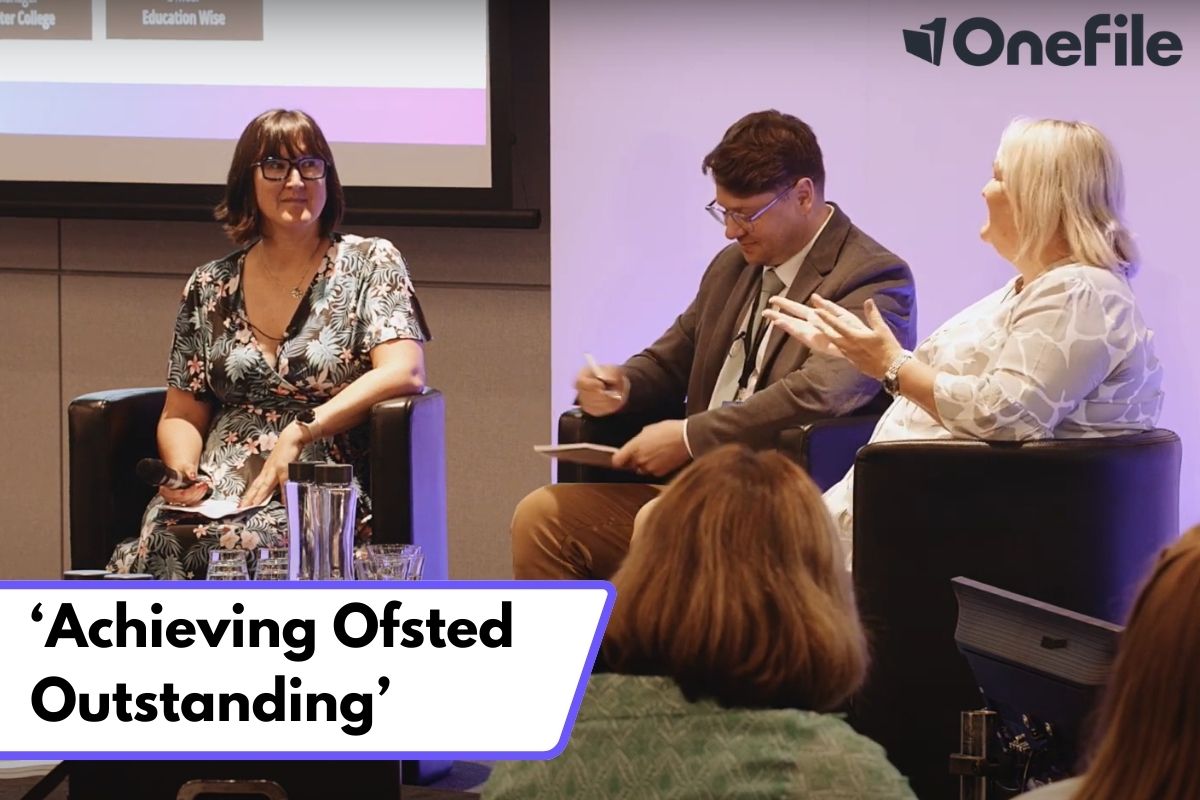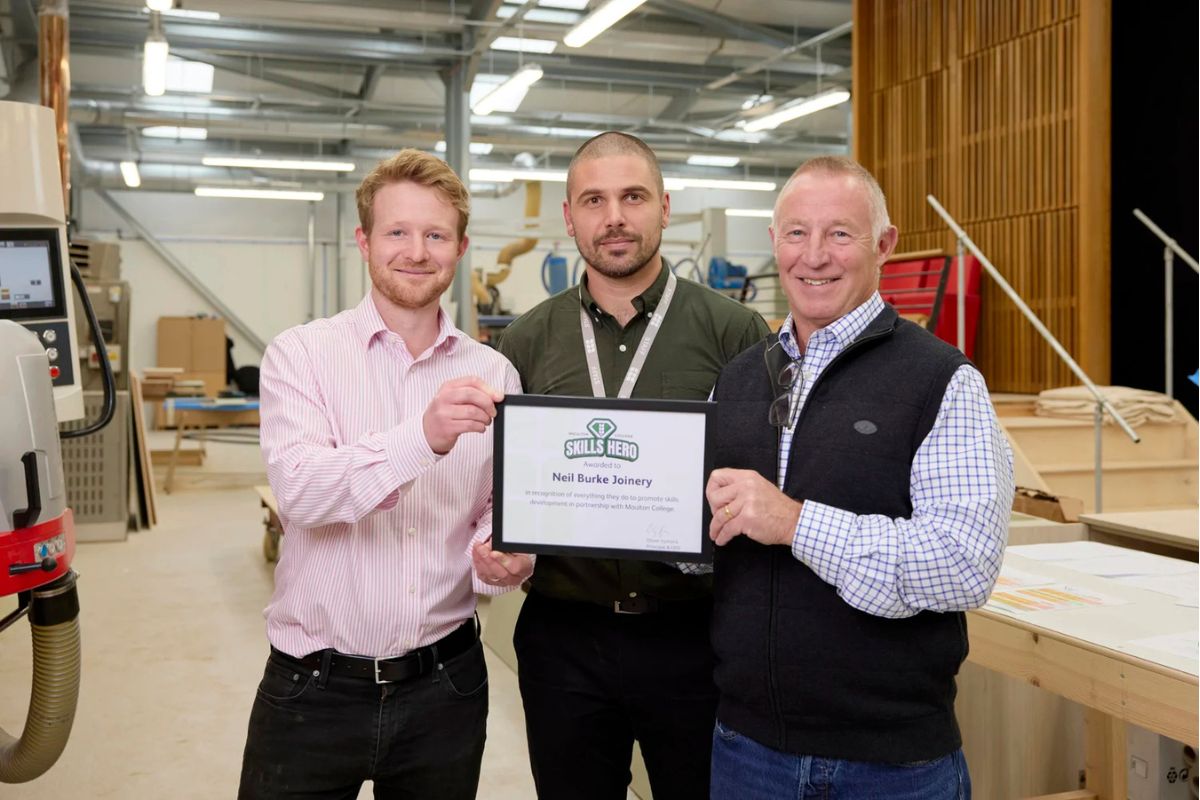‘Achieving Ofsted Outstanding’

Last week at the OneFile user conference I had the pleasure of chairing a session with Susan Bright, Operations and Quality Manager from Exeter College and Gavin Deane CEO/Founder of Educationwise. Both providers were graded Outstanding at their last Ofsted inspections, and we wanted to understand how they felt this was achieved.
The Importance of Preparation
We started off with why it is so important to be prepared for an Ofsted inspection. What would it mean to the organisation if the inspection resulted in a requires improvement or inadequate grade. Sue started by explaining for them it would be reputational damage. The employers and the local community look to the college to be at set an example of best practice and the Ofsted result is a reflection of this. An inspection that does not result in a positive report could ultimately impact revenue for the college as employers or parents may choose other companies for their apprenticeships or child’s further education and their voice in the community would not be as loud. Gavin explained that for an independent training provider a grade of inadequate would normally result in game over and a closure of the provider which would be disastrous.
Preparation was the word of the session – you need to prepare. With only short notice periods before the inspectors arrive, if the lion share can be done before THE phone call, then all the better.
Gavin described preparing a ‘library’ or ‘data room’. He had made the mistake before of firing off megabytes of unorganised files and the inspectors explaining they would not be able to make head nor tail of that easily with the short amount of time they had to review. So, setting up folders for policies, examples of best practices, training plans, data around standards delivered, learner numbers, break in learning, withdrawals, PR/awards won. Keep these up to date as it could be years between inspections so get into the practice of housekeeping these and archiving older information when replacing with more up to date.
Susan prepared a 6 day and a 48hr plan depending on what notice they were given as a larger college. Who would be notified, at what point and what would they be asked to do. Email templates to employers, colleagues, the board were written in advance so it would not take up precious time or information forgotten. Susan shared that they talk in ‘Ofsted’ speak every day to all stakeholders. By doing this, when they are interviewed by an inspector the terminology is familiar and is understood. The more the learners and employers are able to relate to the language being used then more likely they are to understand what examples to give when asked about it.
Ensuring Depth of Understanding
Both Susan and Gavin said that everyone needs to be able to talk in the same language. And board trustees need to be prepared into what kind of questions might be asked and what examples to give. From their experience the trustees will always be asked about safeguarding. It really is as simple as – if you as the provider say you do something – will the learner and employer also say you do and what evidence can you provide to prove it? If you say you provide additional support or masterclasses and the learner says they don’t know anything about it, then expect the inspector dig deeper.
The Education Inspection Framework is your bible. Read it, make notes of where you can provide evidence of achieving each area. If you are not sure about any part of it, ask others what their interpretation of it is. Do not struggle alone, ask other providers if you can learn what they have been doing or how they found the inspection.
When asked what the biggest surprise was – Gavin said it was the volume of inspectors. For a provision of ** learners there were ** inspectors as some were trainees and were shadowing the experienced ones. Susan said it was the fact that they asked to see training plans and observed lessons. They didn’t grade lessons like they used to but did ask to sit in. The inspectors would ask the learners – what have you learnt and what are you doing differently because of it?
Dos and Don’ts During an Inspection
A question from the audience was what the one thing is you shouldn’t do during an inspection. Both Gavin and Sue agreed on lying! If you say something that cannot be backed up by evidence, you will soon be found out and that means other areas will be brought into question. It is much better to be honest and upfront on any weaknesses. If you have an employer who you are struggling with to get the allocated off the job for example – be open and explain what you are doing about it. Let the team feel empowered enough so that if they don’t know an answer for them to say that they will get the information to them.
How OneFile Helped
Both Gavin and Susan said that OneFile had been instrumental in preparing and providing evidence during the inspection. Using the extensive reports in OneFile ensured that gaps in reviews and off the job logs were easily identified and rectified for example. Both said that feedback to the learner was scrutinised and examples in OneFile were used as evidence. It was literally their ’one file’ for programme delivery.
One area where Susan and Gavin differed was whether to give the inspectors a login to OneFile so they could look around on their own. Susan said absolutely no way would she do that and would rather the inspector be shown pages they requested. Gavin was very much – have a login, go wherever you want within the system. Both said the inspectors seemed fine with either approach.
Best Practices
The final question was what 3 tips would you give:
Gavin’s were:
- Read the handbook – understand the 3 I’s – Intent, Implementation and Impact. Prepare examples for each of those.
- Ensure the entire business and other stakeholders understand their role and what will be expected of them if called upon.
- Don’t be afraid to role play questions stakeholders might be asked. For example, Gavin role played with his chairperson. This identified any gaps in knowledge that needed to be addressed.
Susan’s were:
- Visit similar organisations to pick up ideas. Talk to your network to share best practice.
- Plan ahead. Make sure everyone is using consistent language so understand what the inspectors are asking.
- Be proud of what you do well. Prepare examples to show even if you are not asked about them specifically.
We had an hour for the conversation, but we could easily have filled 3 hours. The openness and honesty were so refreshing. It was clear to see that both Exeter College and Education Wise’s focus is on the learners regardless of if they are signed up with them or another provider. Their view is that sharing best practice was essential for the sector and why reinvent the wheel when someone else can help you on your journey. The impact and outcomes for the learner has to take precedence above everything else.
See the conversation at the OneFile conference below:
By Susanna Lawson, with Sue Bright and Gavin Deane
Sue Bright is the Operations & Quality Manager for Apprenticeships at Exeter College. With a vibrant student body ranging from 10,000 to 12,000 strong, Exeter College has recently attained an extraordinary ‘Outstanding’ grade in their latest Ofsted audit. This remarkable achievement stands as a testament to their unwavering commitment to learner progression and excellence. For nearly 15 years, Exeter College has remained a dedicated customer of OneFile, an exceptional partnership that fuels their mission to empower learners and unlock their boundless potential.
Gavin Deane is the Founder and Chief Executive of The Educationwise Academy. The company started in 2016 and is an approved apprenticeship training provider, starting off within the housing sector, leading into the sports and leisure leadership and rail engineering sector. With over 25 years of experience, they’re masters at developing impactful skills and workforce strategies. Plus, they’ve trusted OneFile as their partner for three incredible years. In their latest Ofsted audit, the Educationwise Academy team soared to new heights, securing an exceptional ‘Outstanding’ grade.











Responses